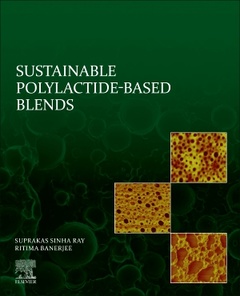Sustainable Polylactide-Based Blends
Auteurs : Ray Suprakas Sinha, Banerjee Ritima

Sustainable Polylactide-Based Blends provides a critical overview of the state-of-the-art in polylactide (PLA)-based blends, addressing the latest advances, innovative processing techniques and fundamental issues that persist in the field. Sections cover the fundamentals of sustainable polymeric materials, polylactide and polymer blends, current and upcoming processing technologies, structure and morphology characterization techniques for PLA and PLA-based blends, and the processing, morphology development, and properties of polylactide-based blends. Final chapters focus on current and future applications, market potential, key challenges and future outlooks.
Throughout the book, theoretical modeling of immiscible polymer blends helps to establish structure-property relationships in various PLA-based polymer blends. With in-depth coverage of fundamentals and processing techniques, the book aims to support the selection of each processing method, along with an understanding of surface chemistry to achieve improved compatibility between phases.
1. Introduction 2. Terminology and dimensions of sustainability, life cycle assessment, and characteristics of sustainable polymer materials 3. Science and technology of polylactide 4. Synthesis, properties, advantages, and challenges of bio-based and biodegradable polymers used for the preparation of blends with polylactide 5. Fundamentals of polymer blend technology 6. Processing technologies for polylactide-based blends 7. Techniques for structural and morphological characterization of polymer blends 8. Mechanical models for polymer blends 9. Polylactide stereocomplex 10. Polylactide/natural rubber blends 11. Polylactide/starch blends 12. Polylactide/chitosan blends 13. Polylactide/poly(hydroxyalkanoate) blends 14. Polylactide/lignin blends 15. Polylactide/natural oil blends 16. Polylactide/poly(butylene succinate) blends 17. Polylactide/poly[(butylene succinate)-co-adipate] blends 18. Polylactide/poly(e-caprolactone) blends 19. Polylactide/poly(butylene adipate terephthalate) blends 20. Market, current and future applications 21. Conclusions, challenges, and future outlook
Dr. Ritima Banerjee completed her Masters in Polymer Science and Technology at the Indian Institute of Technology, Delhi (IITD), India. After working in the polymer industry (GE Plastics and SABIC) for 7 years, she returned to academia. She taught in Delhi Technological University for two years and subsequently completed her PhD from the Department of Materials Science and Engineering, IITD, the area of her work being microcellular processing of thermoplastic elastomer based blends and nanocomposites. She is presently a faculty member in the Department of Chemical Engineering in Calcutta Institute of Technology, India. Her research interests include microcellular processing and the structure-property-processing relationship of polymeric materials.
- Explains fundamental aspects of polylactide-based blends, including characterization methods and property measurement techniques
- Offers comprehensive and detailed coverage of processing, morphology and properties, all organized by blend material
- Analyzes novel methods and addresses challenges associated with PLA-based blends, with a focus on applications and market potential
Date de parution : 02-2022
Ouvrage de 458 p.
19x23.4 cm
Thèmes de Sustainable Polylactide-Based Blends :
Mots-clés :
polylactide; PLA; blend; polymer; biobased; biodegradable; biopolymer; synthesis; properties; structure; morphology; processing; method; technique; applications; sustainable; materials



